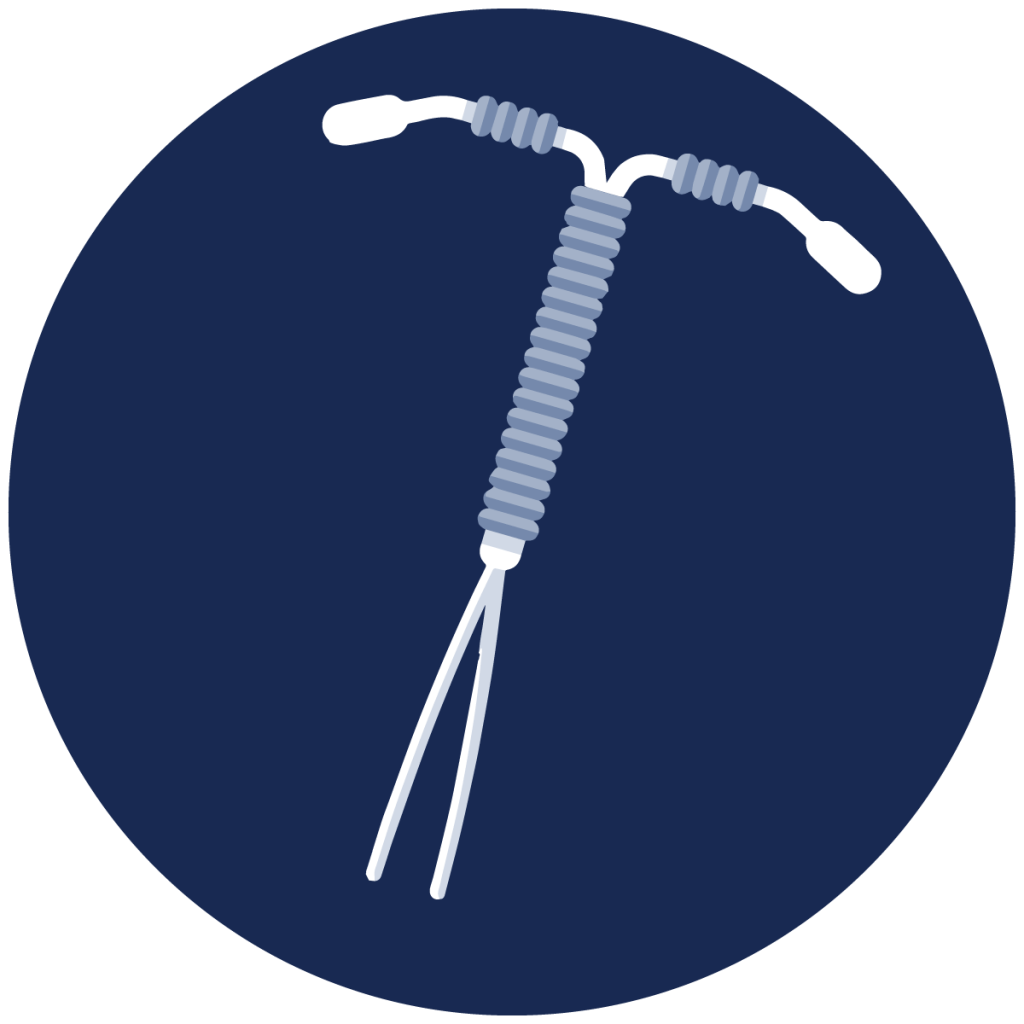Long-Acting Reversible Contraception (LARC) is a well-established umbrella term used by reproductive and sexual health providers and experts. LARC, as a term, encompasses all FDA-approved birth control methods that provide long-term pregnancy prevention options, are reversible (unlike sterilization or permanent contraception), and are proven to be highly effective.
The LARC category of birth control methods includes the intrauterine device (IUD) and the contraceptive implant. The intrauterine device, often interchangeably called an intrauterine contraceptive (IUC), is a small t-shaped device inserted into the uterus by a licensed provider to prevent pregnancy. The contraceptive implant is placed in the arm. While both options are reversible, unlike permanent contraception or sterilization, they require a provider to remove them.
At CTC-SRH, we use the term 'intrauterine contraceptive/IUC' instead of intrauterine device/IUD' because it is a generic term that can include any of the devices regardless of the method of action.
An intrauterine contraceptive (IUC), is a small t-shaped device inserted into the uterus to prevent pregnancy. IUCs are a type of Long-Acting Reversible Contraception (LARC) method. At CTC-SRH, we use the term ‘intrauterine contraceptive/IUC’ instead of ‘intrauterine device/IUD’ because it is a generic term that can include any of the devices regardless of the method of action.
The CTC-SRH offers IUC training for Title X clinical services providers and other sexual and reproductive healthcare providers to perform IUC placements and removals. We have been successfully providing IUC training since 2008, with participants reporting that the training is successful in skills development and building confidence in performing IUC placement and removal.
The training is developed and delivered by highly experienced subject matter experts. This training aims to offer healthcare providers in-depth knowledge of skills, as well as challenging cases that can occur with IUC.

The CTC-SRH offers three different courses to clinicians on the provision of IUC. Find the right one for you:
This training is intended for clinicians who are new to IUC placement and removal or clinicians who need a refresher. Participants complete a self-paced online didactic followed by a hands-on skill-building session which is available virtually and in person. 1.5 CNE/CME is available.
IUC Challenging Cases is appropriate for clinicians with some experience in IUC placement. Participants will consult with colleagues and mentors on complex placement and removal and have a chance to review IUC processes. 2.5 CNE/CME is available.
This training is tailored for experienced healthcare providers who oversee IUC services within their organization. Mentor Training provides guidance on how to coach and mentor less experienced IUC providers who are seeking to improve their confidence and skills in IUC placement and removal. 2.0 CNE/CME is available.
IUC Training is intended for clinicians (CNM, NP, PA, DO, or MD) in the United States and its territories. This training is not available to students as part of their educational curriculum.
Each IUC training is led by a highly experienced reproductive health provider. Clinicians who participate in the skills training receive real-time feedback and coaching with simulation practice. CTC-SRH has been successfully providing intrauterine contraception (IUC) training since 2008 and evaluations confirm that the trainings are successful in skills development and building confidence in performing IUC placement and removal.
Non-Title X providers can attend IUC training for a fee. During registration, you will be able to select if you are a Title X or non-Title X affiliate. If you are unsure of your clinic status, you can clarify with your administrator or search for your clinic on the Title X Clinic Finder.
Another form of Long-Acting Reversible Contraception (LARC) is a contraceptive implant that is over 99% effective. The implant is a very small rod inserted under the skin in the upper arm to provide birth control. The device is invisible as it is placed under the skin and is FDA-approved for up to 3 years of pregnancy prevention, with studies showing continued efficacy for 5 years. Nexplanon is the brand name for the only FDA-approved contraceptive implant available in the U.S.
The FDA requires anyone who inserts or removes the implantable contraceptive to be educated and trained on the product by Organon, which manufactures Nexplanon. After completing an Organon Clinical Training program, a certificate is sent to the provider with a copy sent to specialty distributors. While the CTC-SRH does not provide Nexplanon training, we are able to refer providers to external organizations that conduct the training.

As only Organon is certified to offer Nexplanon insertion and removal training, the CTC-SRH does not offer it. You can connect with Organon training in the ways listed below:
Organon National Service Center
OrganonConnect.com
In addition to IUC Training and the Nexplanon training referrals, the CTC-SRH offers an e-learning course entitled Providing Intrauterine Contraception. This four-part Virtual Coffee Break series reviews strategies for providing IUC in any clinical setting. This series offers both foundational information on IUC and a more in-depth look at the evaluation and management of complicated cases.
The CTC-SRH has created resources such as job aids, podcasts, and clinical protocol templates to help providers perform LARC-related tasks.
This DIALS, recorded on 11/1/2023, featured Dr. Angeline Ti and Dr. Lauren Thaxton. It provides an overview of the research that supports extended use for most methods of long-acting reversible contraception (LARC) available in the U.S., followed by a discussion about techniques for client-led education and counseling for potential extended use LARC.
In the latest installment of the ongoing series, Coding with Ann, Ann Finn, of Ann Finn LLC, discusses updated guidance on common LARC miscodes with the CTC-SRH.
In episode 21 of the NCTCFP's popular Coding with Ann series, Ann Finn, of Ann Finn LLC, provides updated guidance common codes used when billing for IUDs and IUD-related services.
This protocol template is written with several decision points that must be addressed before the protocol is ready for use. Local agencies can use this protocol template to tailor content to their own organization. Decision points are identified as ‘NOTE‘ in the template protocol. Local agencies should only include information that reflects their own organization’s current practices.
This protocol template is written with several decision points that must be addressed before the protocol is ready for use. Local agencies can use this protocol template to tailor content to their own organization. Decision points are identified as ‘NOTE‘ in the template protocol. Local agencies should only include information that reflects their own organization’s current practices.
This job aid includes essential health history and physical exam considerations for intrauterine contraception (IUC) placement. Characteristics of health history, age, and parity are matched to Medical Eligibility Criteria categories to assist with shared decision making in contraceptive counseling.
This job aid prepares clinicians on the risks factors, prevention of, and management of perforation while placing intrauterine contraception (IUC).
This palm card provides common codes for contraceptive management visits, including ICD-10 diagnosis and procedure/supply codes. Contraceptive types include IUDs, Implant, Oral Contraceptive Pills, DMPA, Emergency Contraception, Patch, FABM, Vaginal Ring, and general family planning counseling.
This palm card explores the physical differences between intrauterine contraception (IUC) units on one side to assist providers in identifying IUCs based on their appearance. The other side of the card compares the primary and secondary method of action of levonorgestrel and copper IUCs.
This palm card is intended for staff who provide setup for intrauterine contraception (IUC) procedures.

